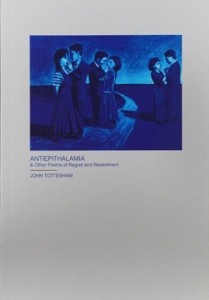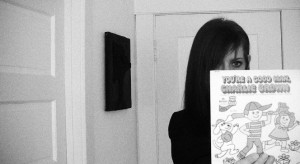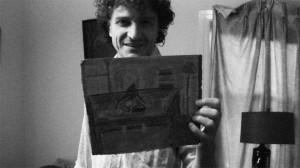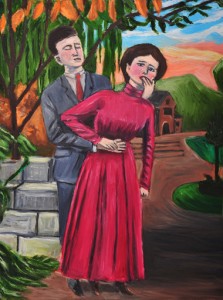An Interview With John Tottenham
 I met John Tottenham at a party hosted in an arcade in March 2012. He approached my friend and asked for a beer from the case she was carrying under her arm. “Let me have one of those,” he said in his British accent. She looked over to me, rolled her eyes and begrudgingly handed him one. “Yes, thanks,” he muttered, pivoting quickly to wander away.
I met John Tottenham at a party hosted in an arcade in March 2012. He approached my friend and asked for a beer from the case she was carrying under her arm. “Let me have one of those,” he said in his British accent. She looked over to me, rolled her eyes and begrudgingly handed him one. “Yes, thanks,” he muttered, pivoting quickly to wander away.
“What an asshole,” my friend mumbled.
I later saw him standing in a dark corner, alone, his eyes half-drawn, leaning on a pinball machine. He looked absolutely miserable. I laughed to myself. His display soothed my own misery. I had been looking for a way home since I arrived.
Six months later, John’s second collection of poetry – Antiepithalamia: And Other Poems of Regret & Resentment – was released on my press, Penny-Ante Editions.
I spoke with John via email.
***
Rebekah Weikel: Your work seems to be embraced by people who don’t normally read poetry.
John Tottenham: Which automatically dooms it to obscurity. All poetry, of course, is automatically doomed to obscurity, but to produce work that is accessible is to make it inaccessible to critics. It leaves them with nothing to do. And the critic has pulled off the outrageous feat of raising himself to the level of the artist and somehow making himself indispensable. But if there’s a direct line between poet and reader, then the critic becomes irrelevant, it could drive them out of business. Clarity is also anathema to people who are steeped in critical theory. The waters must be muddied to make them appear deeper, to give the serious readers and theoreticians something to fish for. Critical theory is a lot of fun but that’s all it is, fun: precisely what it’s supposed to not be. It’s a game for the overeducated. Nobody’s going to go there for wisdom, guidance, solace.
RW: You often write in the first person, but there’s also a contradictory quality.
JT: That’s due to the thorny issue of the unreliable narrator in poetry. It’s something one can get away with in prose – which, for example, Nabokov and Iris Murdoch do very well. But it’s difficult with poetry. People automatically assume that if you’re writing in the first person, you’re being confessional, especially if you’re addressing matters of the heart. I never sit down with the intention of writing a poem about anything or anybody in particular. The way I work is more like surgery or sculpture – a long process of accumulating notes, then chipping away, taking apart, piecing back together.
 RW: I’m surprised to hear you like Iris Murdoch.
RW: I’m surprised to hear you like Iris Murdoch.
JT: She’s not very fashionable. A couple of her novels – The Sea, The Sea and The Black Prince – are great personal favorites. When she writes in the first person, from the perspective of an embittered middle-aged man with frustrated artistic ambitions, she’s unbeatable. Women write with much more insight into male sexuality than men do into feminine sexuality. On the whole, men don’t want to ‘go there.’
RW: While we’re on the subject of embittered middle-aged men with frustrated artistic ambitions, might we touch upon your new book: Antiepithalamia & Other Poems of Regret and Resentment?
JT: It’s my second and – I hope – final collection of poetry. It comprises the supposed cream of my poetic output over the last seven years, since my last slender volume, The Inertia Variations, was first published. An epithalamium is a classical poem celebrating a marriage. These are antiepithalamiums. About half of the book consists of mean-spirited love poems, with particular respect paid to the institution of marriage. It’s a morbid, bitter, mean-spirited, self-pitying book. Taken en masse it constitutes an irredeemably one-dimensional concentration of negativity… best administered in small doses… if at all. I’m told these feelings are normal, but every morning for the last month I’ve woken up in a state of stark horror, contemplating the nature of this monstrosity that is about to be unleashed – not that anybody is likely to pay much attention but by those who do I am sure to be branded as a raving misogynist and misanthrope. Now I realize that people are actually going to be reading this stuff, I’m questioning why I found it necessary or useful to explore the various sordid and unpleasant themes addressed in the book, to really get in touch with feelings of regret, resentment, rejection and revulsion. Mostly, I suppose, because it seemed that nobody else was doing it. Perhaps I flatter myself, but I only hope the innocent reader won’t be as appalled by it as I am.
RW: I’m not appalled by it at all. I love it. I feel you’re providing a valuable service.
JT: That’s what one hopes: that perhaps some poor soul might derive solace or amusement from these bitter words.
RW: That’s the second time you’ve mentioned solace. Is it an important element for you?
JT: Having been cheered and consoled by the bitter words of others, one can only hope that one might be providing a similar service. Where would I be without all of the books I’ve read and music I’ve listened to – that have provided the backdrop, even the substance, to every moment of my existence?
the redundant completist trapped in his cave of musty retention,
buried under years of absorption… unaborted,
decades of consumption… consumed,
sacrificed at the altar of other people’s art,
while everything else fell apart.
Pondering, at last, all the pointless consolation,
questioning if it was really necessary to devour entire genres
until I was crapulous from gorging myself on culture.
As if it were some kind of achievement
to accumulate all this knowledge that will die with me.
So that on my headstone it will read: that I read
and lived a lot of fiction… that Art ruined my Life.
RW: In a couple of poems in this collection – Avalanche and Parasitology – you lament having consumed too much culture.
JT: That’s definitely a problem. Completism has been one of the banes of my existence. When I consider the ratio between the amount of time I’ve spent consuming other people’s work and the amount of time I’ve spent producing my own, it is deeply dispiriting. I think I felt that I had to read, listen, watch, even live as much as possible before producing work of my own. Unfortunately, out of indolence and contrariness, I dragged out this perverse form of empiricism for ten, perhaps twenty years longer than necessary before making a move.
RW: Are you referring to The Inertia Variations?
JT: I waited for a subject until waiting itself became the subject. And, frankly, it wasn’t worth the wait. I only fell into this poetry lark by default, as a failed prose stylist, and I intend to return to failing at it. I haven’t been writing poetry for very long compared to the amount of time I’ve spent struggling with prose, although I have very little to show for the twenty years I spent honing my craft. I’ve never stopped writing prose but I finally resigned myself to poeticizing on February 13th 2003, when, quite by accident, I wrote an Inertia Variation. I stopped in the autumn of 2011, also accidentally, having finally, thankfully, run out of steam in that area. The maximalist prose works I always envisioned ended up as miniature poems. Writing poetry is a disgusting habit – a futile, thankless and masochistic pursuit. I’m trying to quit. I haven’t written a poem in a year, and I hope to keep it that way. One day at a time.
RW: Why futile?
JT: As any unknown poet will tell you, the poetry scene is an entirely nepotistic and incestuous arena. There is no recognized standard of quality because there is no ‘supply meets demand’ dynamic such as exists in music or art where middlemen are perpetually scurrying around trying to satisfy the appetites of an ever-multiplying audience hungry for whatever mediocre rubbish is thrown at them. With art and music there’s an actual audience whose response determines popularity. Everybody recognizes a good song but nobody can tell you what constitutes a good poem. Sometimes, for fun, I’ll quote a few lines from a famous poem to somebody and then a few lines of my own, and nobody, even well-informed and educated types, can tell the difference. Because there isn’t much of an audience for poetry and no market value attached to it, it follows that there is no universally recognized criterion of quality, so it’s easy to perpetuate a closed-world incestuousness, which is determined by critical and academic preciosity. It’s not like sport, where you have to be the best player to compete. The cream doesn’t rise to the top, because there is no top. It curdles, at the bottom, into bitterness.
RW: What might you do instead? I know that you’ve achieved some success as an artist lately.
JT: A couple of shows at respectable galleries have surprisingly come my way. But much as I enjoy painting and drawing, and find it satisfying and, of course, more financially rewarding, I can’t entirely give myself over to it. I don’t feel I have anything to offer the world of fine art. There are thousands of better artists than me, but for better or worse, I’m morbidly addicted to writing. I can’t rid myself of the conceit that I have something to say as a writer, even if I don’t want to write it and nobody wants to read it.

RW: I first became aware of you in January 2012 when I was leafing through the LA Weekly and found: The Literary Event of the Year… So Far. John Tottenham reads from The Inertia Variations. That’s quite a statement. Seemed a bit overconfident.
JT: Why not? It was only January, and it was a qualified statement. But it’s true, I have given some memorable and well-received readings around town since then, and the candlelit reading in San Francisco in September, which was orchestrated by the panting and moaning of two lesbians writhing around on the floor in the corridor, was a lot of fun. Then there was the Antiepithalamia publication party at Annie Besant Lodge in Beachwood Canyon a few weeks ago.
RW: With Penny-Ante’s investment in the Besant Lodge, I was of course a tad nervous of the outcome. I don’t think I’ve ever been to such a well-attended poetry reading. In fact, I heard several people make that observation. I also heard several people refer to your act as performance art, rather than ‘reading.’ Is that something you’re conscious of?
JT: That was a gratifying reading because, to my initial horror, I had to win the audience over. It was very unsteady at first. I’d prepared an introductory spiel that I assumed was a guaranteed crowd pleaser but I looked out into a sea of puzzled, pitying expressions. There were silences where I had anticipated laughter and that was unsettling. Once I acknowledged those looks and silences, it went a lot more smoothly.
RW: Do you gauge a ‘successful’ reading by audience laughter?
JT: I’m a whore for the laughter. Half a minute without it makes me nervous, I fear that the material isn’t going over and resort to desperate measures to get cheap laughs, which is perhaps misguided, as many audiences don’t register their appreciation with laughter at all. I don’t know how other performers can stand the lack of it. I’ve seen people read for half an hour without getting a single laugh, yet they view the reading as a success. If people relate to something they will often laugh, even if it isn’t, strictly speaking, funny. There’s laughter of recognition when people are relieved to hear something they have thought being said out loud. But my few forays into stand-up haven’t been too encouraging, and a short tour of the Midwest a few years ago divested me of any notions I previously had about my work having universal appeal. At one reading in Wisconsin I read to an audience of three people: two college girls and a woman in a mobile wheelchair who rolled in halfway during the reading, and none of them ‘got’ it. If you’re going to be a stand-up poet, which sounds horrible, then you’re going to have to make fun of the poetry itself, and I don’t want to do that. It’s too poetic for stand-up, too stand-up for poetry. That’s another of my tragedies. I could go on. But it’s all downhill from here.
RW: Will that hill ever level?
JT: Maybe, if it’s given enough attention.
***
John Tottenham is a British-born poet and artist living in Los Angeles. He is the author of two collections of poetry, The Inertia Variations (K-Bomb) and Antiepithalamia & Other Poems of Regret and Resentment (Penny-Ante Editions). His series of Victorian Choking Paintings and ink works have been shown at Las Cienegas Projects and the Rosamund Felsen Gallery in Los Angeles.
Rebekah Weikel is a publisher and project curator.
Tags: author interviews, interview, John Tottenham, penny-ante editions, Rebekah Weikel

BIG FAN, BIG FAN
this is great
http://851thesquat.tumblr.com/post/31739975914/live-at-851-september-13-2012-book-launch
interesting interview
Fantastic! So glad to know of John Tottenham-finally! pure honesty! I, too, am trying to “give it up” but as John Tottenham says “One day at a time.”
[…] exists for poetry, but it’s a relatively small one. This is why, as John Tottenham has said (in an interview with Rebekah Weikel), “all poetry is doomed to obscurity”; as a result “there is no recognised standard of […]